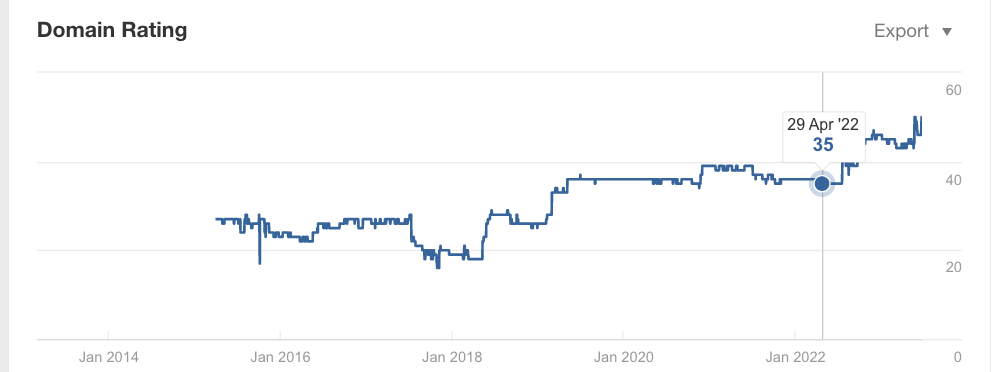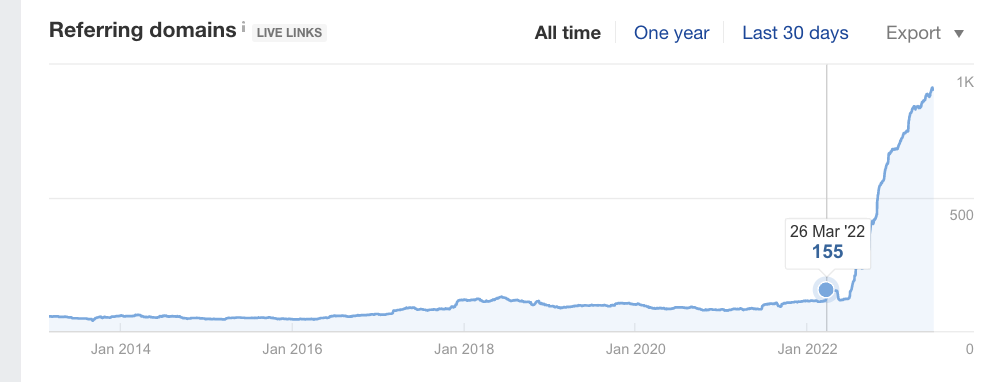Within a few months, our site traffic, backlinks and domain rating soared

Generative AI has rocked the tech world, and every company is now considering if there is a way for them to leverage this technology. Since the introduction of ChatGPT, the tech industry has been buzzing with its potential impact, especially in content-heavy industries like marketing and advertising.
We used OpenAI to improve our SEO ranking on Google, which had positive results across the board. In less than a year, our site’s organic traffic went from nothing to approximately 3,500 visitors a month, the domain rating increased by over 40%, and the backlinks increased by over 500%.
We increased our organic traffic

Our site’s organic traffic saw a sharp increase after we started using OpenAI in March 2022. Image Credits: Cyber Switching
Our domain rating saw an increase of over 40%

Our domain rating saw an increase of over 40%. Image Credits: Cyber Switching
Given the SEO ranking improvement, our domain rating saw an increase of over 40%.
And we boosted backlinks by more than 500%

We used OpenAI to boost backlinks by more than 500%. Image Credits: Cyber Switching
All screenshots are from June 23, 2023.
Through keyword-optimized blog posts generated by ChatGPT, we were able to really hone in on target keywords that rank high for many of the target phrases, like “best 48 amp ev charger.” It also allowed us to join the conversation with many other blogs by increasing our keywords from 300 to over 7,000, which led our website clicks to jump from 100 per month to 4,000.
Here are a few ways any business can utilize generative AI technology to optimize their marketing strategy.
Train the AI system to find optimal keywords
Before asking ChatGPT to generate an entire strategy document from scratch, you need to begin with the basics. Start by identifying your goals and let that inform your process. Ask ChatGPT for the most common keywords related to your industry, then drill down farther from there by asking for alternate phrases and options.
We started with the question:
- What are the most common SEO keywords related to the EV charging industry?
It provided a list of 20 phrases such as “electric vehicle charger,” “EV charging station,” “level 2 charger,” and “home EV chargers.” The AI is not perfect: ChatGPT recommended keywords associated with home EV chargers when our SEO needs to focus on commercial EV chargers.
Once you settle on the relevant keywords, ask ChatGPT to organize the list into commercial, transactional, and informational words. These categories will be crucial for the smart prompts used later on to create targeted content for various areas of your website.
You’ll also need to do the same keyword search in order to build OpenAI’s knowledge of your company. Give the AI tool additional information, like the boilerplate from your last press release, the “About” section on your website, your company’s social media profiles, or any other assets you already have.
There is no need to reinvent the wheel, so use content you’ve already worked on to help generate better keywords, recommendations, and ultimately, your marketing strategy.
As we fed the AI system more information, the results formulated improved and the recommendations got better. Remember that AI is about training the data, so as you progress, the answers shared will become more and more accurate. The more data you provide the AI tool, the better it will understand your company and industry.
Use targeted categories to create marketing content
After using AI to highlight target keywords within your website as well as your industry, you can develop an SEO strategy guaranteed to help you secure a top spot in search results.
One of ChatGPT’s best use cases is for content generation like blog ideas, titles, and website copywriting. Make sure to do this in the same ChatGPT thread you started with, as this is where you have trained the AI system. Here is a prompt you can use to get this going:
"strategy" - Google News
July 21, 2023 at 02:00AM
https://ift.tt/UFYEn9p
We tried using OpenAI to generate marketing strategies — and it worked - TechCrunch
"strategy" - Google News
https://ift.tt/O6GHqIV
https://ift.tt/fcCInxJ
Bagikan Berita Ini














0 Response to "We tried using OpenAI to generate marketing strategies — and it worked - TechCrunch"
Post a Comment